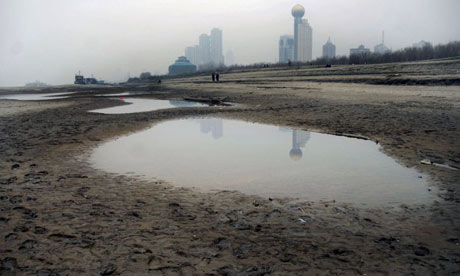17 January 2008Jonathan Watts
 A river bed is exposed as water levels fall along the Yangtze river near Wuhan, central China's Hubei province. Photograph: AP
A river bed is exposed as water levels fall along the Yangtze river near Wuhan, central China's Hubei province. Photograph: APThe waters of the Yangtze have fallen to their lowest levels since 1866, disrupting drinking supplies, stranding ships and posing a threat to some of the world's most endangered species.
Asia's longest river is losing volume as a result of a prolonged dry spell, the state media warned yesterday, predicting hefty economic losses and a possible plague of rats on nearby farmland.
News of the drought - which is likely to worsen pollution in the river - comes amid dire reports about the impact of rapid economic growth on China's environment.
The government also revealed yesterday that the country's most prosperous province, Guangdong, has just had its worst year of smog since the Communist party took power in 1949, while 56,000 square miles of coastline waters failed to meet environmental standards.
But the immediate concern is the Yangtze, which supplies water to hundreds of millions of people and thousands of factories in a delta that accounts for more than 40% of China's economic output. According to the Chinese media, precipitation and water levels are at or near record lows in its middle and upper stretches.
The scale of the problem was revealed by the Yangtze water resources commission in a report on the Xinhua news agency's website yesterday. It said that the Hankou hydrological centre near Wuhan city found the river's depth had fallen to its lowest level in 142 years.
The measurement confirmed fears raised in recent weeks by the appearance of islands and mud flats not normally seen at this time of year. Local farmers reported far more ships than usual being trapped in unnavigable shallow waters.
Jianli county is among the areas suffering water shortages. Officials say the problem has grown worse in the past decade, raising concerns of a link to climate change.
"Before 1996, we were short of water for three months of the year, but now there are only three months when we can use water as normal," Wu Chunping, the vice-manager of Jianli county's water utility, was quoted as saying by Xinhua. "I heard that the water level will drop further in February."
Li Lifeng, director of the freshwater programme of WWF China, said: "The major worry is for aquatic species and birds. If the water level goes too low they will lose a huge level of habitat."
Among the endangered animals likely to be affected are the finless porpoise and the Chinese sturgeon, which returns to the sea at this time of year.
With the Yangtze three times as crowded with traffic as the Mississippi, conservationists fear the animals will be torn up by boat propellers or contaminated by more concentrated pollution from the 9,000 chemical plants along the Yangtze. Birds such as the Siberian crane may also suffer from the impact on their wintering area.
Local media have expressed concern that the drought could lead to a plague of rats similar to the one near Dongting lake last year after a drought was followed by fast-rising waters that drove the vermin to seek food in farm fields. "When the waters fall, the reeds die and the rats are driven inland in search of food," said an official in the Yueyang farming and aquatic bureau who declined to give his name.
http://www.guardian.co.uk/environment/2008/jan/17/drought.china






